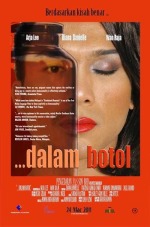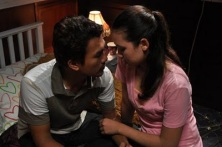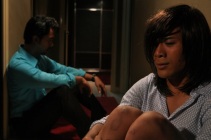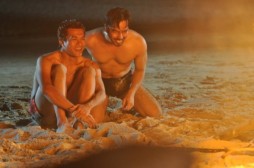 This was a review long time in the making. I had seen it some time ago (well, last year, though last year wasn't that far off at this moment in time, come to think of it), and have watched it again recently for the purposes of research. I figured this would be a good time as any to get the review, which was something I had in mind, out of the way.
This was a review long time in the making. I had seen it some time ago (well, last year, though last year wasn't that far off at this moment in time, come to think of it), and have watched it again recently for the purposes of research. I figured this would be a good time as any to get the review, which was something I had in mind, out of the way.
First off: this film is not a gay film. Despite what the filmmakers have said and promoted as such, this film shares elements with 'Brokeback Mountain', much like 'Bini-Biniku Gangster' shared elements with 'My Wife is A Gangster'. To be more accurate, although there are indeed homosexual elements involved in the film, the film deals with the ostracisation, marginalisation and evetual disappointment and frustration felt by a transsexual, not a homosexual person. There is a difference, and it is this change in gender that would provide the film with the interesting spices required.

Thousands of words crammed in this picture...
Rubidin (Arja Lee) and Ghaus (Wan Raja) are a pair of lovers who are…well, in love. One night, spent carvorting around on the beach, Ghaus made the comment that he wanted Rubidin to become a woman. At least, that was the inference that Rubidin made. As a result, he underwent a sex change operation, transforming overnight (within the context of the film, at least) into Ruby.
Of course, even constructions of men remain the same in LGBT (lesbian, gay, bi, transsexual) films. In this case, Ghaus proves to be a jerk, failing to accept and deal with Ruby being Ruby, rather than Rubidin. He decided to end their relationship, leaving Ruby in a bit of a lurch. Well, more than just a bit, because she owes a fair amount of money to someone who could possibly be a loan shark. Rubbing salt into the wound, Ghaus ends up selling Ruby's car to make some money of his own on the side as well. Distressed, Ruby returns to his kampung, and becomes Rubidin again.
Though his family wasn't entirely satisfied with his decision to change his sex, this time around, they were more accepting. Even more interestingly, Dina (Diana Danielle), a local girl, starts to fall in love with him. Rubidin, encouraged by his mother, starts to make inroads with her (and what a lovely girl to be making inroads with), but the ultimate question remains: how much of a man can someone who no longer has his manhood be?

Not just an excuse to show Diana Danielle.
That last part wasn't much of a secret. The original title for this film is 'Anu Dalam Botol' (actually, the film had many original titles, but let's not get into that). The ellipses replaces the first word, rendering it mute for socio-political purposes. However, an interesting inference could also be made for its lack, referencing to the lack of manhood to be found within the film. Here, we can apply a wider reading; yes, the literal meaning to be made is Rubidin transforming into Ruby, but the men in the film also leaves plenty to be desired. They are not necessarily the kind of men you would consider 'manly', so to speak. Ghaus, for example, was confusingly frustrating and inconsistent with his characterisation, but the one conclusion that can be made is that if he was anywhere near my own life, even as an acquaintance, he would have be phased out a long time ago. Ruby's father, Pak Mus (Jalil Hamid), did not help either, representing the authorial figure that looks down on such identification with disdain. The only other male figure, beyond the star, who appears to have redeeming and attractive qualities is Ruby's best friend.
The film itself is an exercise in exploration the time-spatial continuum in storytelling, with certain scenes not exactly fitting into the chronological order as many might have expected. I must, therefore, praise the director, Khir Rahman, for attempting, even in a small way, to create a more wholistic experience through cinematic language. For example, earlier on in the film, Ruby's face was not immediately and clearly revealed to us. We see her only from behind, moving through and up her apartment complex, at times always in shadows, but never as clearly defined until she is inside her own apartment. This could be an introduction to the difficulties faced in negotating expressions of gender identity within and without the public and private space.

Empty fridges makes people depressed.
I have to admit, however, at times, it does get a little too much. She comes home, for example, to a fairly bare apartment, and proceeds to lean against the wall. On the wall, a portrait of two men, (un)dressed somewhat provocatively, hugging each other is hung. She goes to the fridge, opens the door, and it is completely empty except for two eggs. To understand the significance of this, a deeper understanding of the Malay language is required, in particular the vernacular use for the word egg, telur, which can also come to represent, for the lack of a better term, your balls. Read into that what you will, and believe you me, if your mind is totally switched on, there'll be plenty for you to read.
Ultimately, this film deserves praise for telling a story in a sincere effort, with a multi-layered complex that means multiple readings of this film should be encouraged. That's quite a rare feat for any film, let alone a Malaysian one, and praise must be given to the director and producer, Raja Azmi, for having the telur (metaphorically speaking, of course) to push this project though. The acting is also fairly impressive; I did not believe it when I found out that this was Arja Lee's official feature film debut. A final note: this film, of course, was fairly controversial upon its release.

Their love was heaven sand (sent). Ho hum.
There are two things I'd like to touch upon before calling it a night. One, the ending of the film suggests that this film is somewhat homophobic, which was exactly what a film review I came across in my researched stated. Some have suggested that this film does nothing but enforce stereotypes and uninformed opinions. While some may do so upon the reading of this film, I believe that it is more pertinent to consider the space offered through this film which allows for more alternative, and perhaps more accurate readings of this situation. As such, though the ending of such a film may have indeed been regulated by socio-political forces, we should read the film with that knowledge in mind (perhaps what is required is a renegotiation of the context of such a screening; aFurthermore, it was also based on a true story; how much of reality made it to this reelity is not entirely clear to me, but the ending suggested that the film's end mirrored life as we know it. It would be ironic, then, if the film had changed it's ending to a fairytale one so that people can get their kicks and then truly claim to be realistic.
Secondly, this film itself represents a landmark in Malaysian commercial cinema (differentiated here from independent cinema, whose fridges are filled to the brim with Omega eggs). Once again, while this film and other such films in the future may still be strictly regulated, this is a huge step forward for the industry and film spectatorship in Malaysia as a whole. For all intents and purposes, the film can be considered a success, and I believe that having such a film made, released and received does not necessarily reinforce stereotypes, but provided little rungs on the stairs to greater heights, a height where we can explore such issues more and more openly.
That is all. Good night, and good luck.
Advertisement
Like this:
Be the first to like this post.








Tiada ulasan:
Catat Ulasan